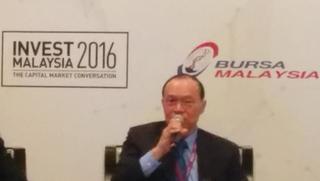KUALA LUMPUR — Top Glove and Hartalega Holdings, two of the world’s largest rubber glove manufacturers, intend to increase prices to offset the effects of an appreciating Malaysian currency and other burdens.
“The industry will pass on the discount when the ringgit weakens,” Hartalega Managing Director Kuan Mun Leong told reporters on Wednesday. But when there is a reversal, he stressed, “we have to raise prices.”
Kuan was speaking on the sidelines of Invest Malaysia 2016, a conference on capital markets also attended by Top Glove representatives.

Top Glove Chairman Lim Wee Chai speaks at Invest Malaysia in Kuala Lumpur on April 14.
Top Glove, too, said its “pass-through mechanism” will allow it to share higher expenses — as well as savings — with its customers.
Taking punches
Top Glove focuses on latex powdered gloves, which are commonly used in developing countries. Developed countries favor nitrile gloves — Hartalega’s forte.
Nitrile is a synthetic rubber that is more resilient than natural latex rubber. About 68% of glove demand comes from advanced economies like the U.S., Europe and Japan.
Natural latex prices are at an all-time low due to slowing demand from China. Still, the strengthening ringgit poses a challenge for exporters: The Malaysian currency has gained 6% against the dollar in the past month and recently touched 3.87 to the greenback.
As for nitrile, Kuan said about 95% of Hartalega’s products are made of the material. “Historically,” he said, “it’s traded in U.S. dollars. So there is a natural hedge, since about 30-40% of our cost is nitrile rubber.”
But prices of nitrile rubber, a byproduct of petroleum, correlate with crude oil. The Brent crude benchmark on Tuesday set a new high for 2016, hitting $44.68 per barrel on news of an imminent production freeze. Back on Jan. 20, the price was at a low of $27.82.
These headwinds come as Peninsular Malaysia’s minimum monthly wage is set to rise to 1,000 ringgit ($255) from 900 ringgit. Top Glove said this will impact the cost of glove-making, though it also plans to mitigate the effects by automating more of its production line.
Top Glove said it still sees bright growth prospects and aims to raise its global market share to 30% by 2020, from 25% now. To get closer to that goal, it plans to make one or two acquisitions this year.
The company said it is prepared to spend up to 1 billion ringgit on the deals and is already negotiating with a few targets. Top Glove expects to carry out a secondary listing on Singapore’s bourse on June 28.
























